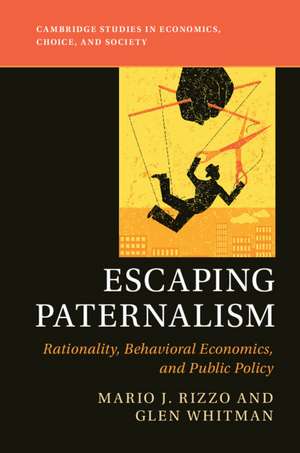Escaping Paternalism: Rationality, Behavioral Economics, and Public Policy: Cambridge Studies in Economics, Choice, and Society
Autor Mario J. Rizzo, Glen Whitmanen Limba Engleză Paperback – 4 dec 2019
| Toate formatele și edițiile | Preț | Express |
|---|---|---|
| Paperback (1) | 291.68 lei 43-57 zile | |
| Cambridge University Press – 4 dec 2019 | 291.68 lei 43-57 zile | |
| Hardback (1) | 870.35 lei 43-57 zile | |
| Cambridge University Press – 4 dec 2019 | 870.35 lei 43-57 zile |
Din seria Cambridge Studies in Economics, Choice, and Society
-
 Preț: 243.55 lei
Preț: 243.55 lei -
 Preț: 163.31 lei
Preț: 163.31 lei -
 Preț: 135.65 lei
Preț: 135.65 lei -
 Preț: 176.62 lei
Preț: 176.62 lei -
 Preț: 197.90 lei
Preț: 197.90 lei -
 Preț: 166.79 lei
Preț: 166.79 lei -
 Preț: 176.86 lei
Preț: 176.86 lei -
 Preț: 278.72 lei
Preț: 278.72 lei -
 Preț: 203.50 lei
Preț: 203.50 lei -
 Preț: 252.69 lei
Preț: 252.69 lei -
 Preț: 219.90 lei
Preț: 219.90 lei -
 Preț: 363.07 lei
Preț: 363.07 lei -
 Preț: 288.62 lei
Preț: 288.62 lei -
 Preț: 205.41 lei
Preț: 205.41 lei -
 Preț: 299.62 lei
Preț: 299.62 lei -
 Preț: 262.24 lei
Preț: 262.24 lei -
 Preț: 259.34 lei
Preț: 259.34 lei -
 Preț: 228.08 lei
Preț: 228.08 lei - 14%
 Preț: 725.57 lei
Preț: 725.57 lei -
 Preț: 290.38 lei
Preț: 290.38 lei - 11%
 Preț: 693.69 lei
Preț: 693.69 lei - 11%
 Preț: 705.18 lei
Preț: 705.18 lei
Preț: 291.68 lei
Nou
Puncte Express: 438
Preț estimativ în valută:
55.81€ • 58.42$ • 46.45£
55.81€ • 58.42$ • 46.45£
Carte tipărită la comandă
Livrare economică 31 martie-14 aprilie
Preluare comenzi: 021 569.72.76
Specificații
ISBN-13: 9781108760003
ISBN-10: 1108760007
Pagini: 506
Ilustrații: 3 b/w illus.
Dimensiuni: 157 x 228 x 27 mm
Greutate: 0.73 kg
Editura: Cambridge University Press
Colecția Cambridge University Press
Seria Cambridge Studies in Economics, Choice, and Society
Locul publicării:New York, United States
ISBN-10: 1108760007
Pagini: 506
Ilustrații: 3 b/w illus.
Dimensiuni: 157 x 228 x 27 mm
Greutate: 0.73 kg
Editura: Cambridge University Press
Colecția Cambridge University Press
Seria Cambridge Studies in Economics, Choice, and Society
Locul publicării:New York, United States
Cuprins
1. Introduction: puppets and puppet masters; 2. What is rationality?; 3. Rationality for puppets; 4. Preference biases; 5. The rationality of beliefs; 6. Deficient foundations for behavioral policymaking; 7. Knowledge problems in paternalist policymaking; 8. The political economy of paternalist policymaking; 9. Slippery slopes in paternalist policymaking; 10. Common threads, escape routes, and paths forward; References; Index.
Recenzii
'Taking issue with the narrow norms of rationality in much of behavioral economics, this remarkable book argues in favor of an inclusive concept of rationality and is one of the first to cover the full range of relevant empirical evidence from psychology. Escaping Paternalism promotes a serious attempt to understand why people do what they do.' Gerd Gigerenzer, Director of the Harding Center for Risk Literacy, Max-Planck-Institut für Bildungsforschung, Berlin
'Mario J. Rizzo and Glen Whitman have written an incisive yet accessible critique of the dominant strain of behavioral economics associated with Daniel Kahneman, Richard Thaler and Cass Sunstein. Rizzo and Whitman are wise enough to know that human beings, with quirks and practices, are 'people, not puppets'. Yet they show how classical liberal principles of governance do far better in organizing social arrangements than the various forms of soft paternalism now in vogue with so many behavioral economists.' Richard Epstein, Laurence A. Tisch Professor of Law, New York University
'Mario J. Rizzo and Glen Whitman present a powerful and well-documented critique of behavioural economists' justifications of paternalism. They argue convincingly that these justifications illegitimately presuppose that rational-choice theory is a normative standard. Inspired by the psychology of Gerd Gigerenzer, they offer a more pragmatic and 'ecological' understanding of human rationality.' Robert Sugden, University of East Anglia
'Mario J. Rizzo and Glen Whitman have written an incisive yet accessible critique of the dominant strain of behavioral economics associated with Daniel Kahneman, Richard Thaler and Cass Sunstein. Rizzo and Whitman are wise enough to know that human beings, with quirks and practices, are 'people, not puppets'. Yet they show how classical liberal principles of governance do far better in organizing social arrangements than the various forms of soft paternalism now in vogue with so many behavioral economists.' Richard Epstein, Laurence A. Tisch Professor of Law, New York University
'Mario J. Rizzo and Glen Whitman present a powerful and well-documented critique of behavioural economists' justifications of paternalism. They argue convincingly that these justifications illegitimately presuppose that rational-choice theory is a normative standard. Inspired by the psychology of Gerd Gigerenzer, they offer a more pragmatic and 'ecological' understanding of human rationality.' Robert Sugden, University of East Anglia
Notă biografică
Descriere
A powerful critique of nudge theory and the paternalist policies of behavioral economics, and an argument for a more inclusive form of rationality.
